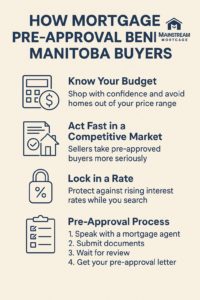🏡 The Hidden Advantages of Mortgage Pre-Approval Most Home Buyers Miss
By Avaljit Sandhu – Mortgage Professional, Dominion Lending Centres
Mortgage Pre-Approval Is More Than Just a Budget Tool
When most people think of mortgage pre-approval, they assume it’s just about knowing how much they can afford. While that’s true, pre-approval offers several hidden benefits that can give you an edge in Manitoba’s competitive real estate market.
Let’s uncover those lesser-known advantages and how they can help you buy with confidence.
Why Pre-Approval Matters in Today’s Market
In a province like Manitoba, where home prices are stable but rising, being financially prepared is critical. With more buyers entering the market, sellers are looking for buyers who are ready to act fast.
A mortgage pre-approval sends a strong message:
✅ “I’ve done my homework. I’m ready to buy.”
The Overlooked Benefits of Pre-Approval
1. Confidence in Negotiations
When you know your financing is likely to be approved, you walk into negotiations with stronger confidence. You know your limits and can negotiate firmly.
2. Better Relationship with Your Realtor
Agents love working with pre-approved clients. It helps them focus on homes you can realistically afford and speeds up the search process.
3. Protects You from Rate Increases
If rates are expected to rise, a pre-approval with a 120-day rate hold can save you thousands over your mortgage term.
4. Allows You to Spot Weak Points in Your Application
Sometimes clients don’t realize they have issues like inconsistent income, outdated credit reports, or unverifiable funds. Pre-approval helps you fix these early.
The Pre-Approval Process – What to Expect
Working with a mortgage broker in Winnipeg makes the pre-approval process smooth and stress-free.
Here’s a simple breakdown:
Step 1: We Review Your Income and Credit
This includes:
-
Job letter
-
Paystubs
-
T4s and Notices of Assessment
-
Credit check (soft pull through a broker)
Step 2: Review Your Down Payment
We ensure your bank statements are acceptable and verify the source of your funds.
Step 3: Rate Lock and Guidance
You get a rate hold and advice on next steps, so you can begin your home search with a clear strategy.
What If You’re New to Canada?
If you’re on a work permit or a new permanent resident, pre-approval also shows lenders how you’re establishing financial stability. You may be asked to show:
-
Alt credit (like rent, car insurance, or phone bills)
-
Bank statements
-
Status documents
Pre-approval helps newcomers prove they’re mortgage-ready.
Final Thought: Don’t Shop Without It
Buying a home without pre-approval is like bidding at an auction with an empty wallet. Even if you’re early in your journey, pre-approval is risk-free, free of charge, and gives you a head start.
FAQ – Pre-Approval Questions Answered
Q1: What if I change jobs after getting pre-approved?
This could affect your application. Always consult your mortgage broker before making major changes.
Q2: Can I get pre-approved with student loan debt or credit cards?
Yes. We factor in your debts to calculate what you can afford.
Q3: Can I get pre-approved if I’m self-employed?
Absolutely. You’ll need two years of tax returns and possibly business financials.
Q4: How long does a pre-approval last?
Typically 90–120 days.
Q5: Is there a cost to get pre-approved?
No. As a licensed broker, I provide this service free of charge for home buyers.
✅ Need Help Getting Pre-Approved?
Let’s talk! I can walk you through the process, answer questions, and help you feel confident about buying in Manitoba’s housing market.








